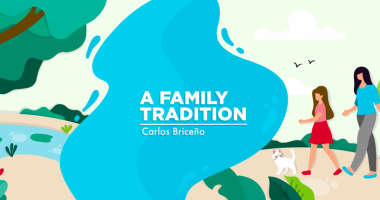Sadness About Huntington’s Disease Can Be Overwhelming at Times
Columnist Carlos Briceño and his wife, Jill, grapple with the reality of HD

I love to write, but staring at a blank screen before my fingers start to press down on the keyboard can be daunting. That’s why I appreciate my wife, Jill, collaborating with me on these columns. She’s tremendously helpful in discussing possible topics with me and making countless suggestions about my writing.
It’s sad to write about her being gene-positive for Huntington’s disease (HD), but it’s also sweet that we get to work together.
As I sat down this week to discuss possible topics with Jill, she asked if she could take a week off from talking about her issues. She told me to write what I wanted, without her input.
I asked her what was wrong. She looked at me with tears in her eyes and said, “I just feel sad this week.”
Jill hasn’t been sleeping well lately, and I know it’s starting to take an emotional toll on her. I hugged her and asked if she wanted to talk, and she just crumbled. She looked like a marionette doll whose strings had suddenly been cut.
She told me she wasn’t in the best mental state to talk about Huntington’s. She’s been thinking about how she’s going to suffer a slow death that will rob her of her mind and body one day.
We hugged, and I started crying, too.
I understand what’s in store for her. I saw her father deteriorate from HD, and I try to live in the present so that I’m not thinking about what her future will hold. I told Jill to take as much time as she needed.
I grabbed my computer and headed downstairs to write, a wave of sadness crashing over me like a tsunami. Sadness for what Jill was feeling, and sadness for myself. I quickly told myself I needed to stop and be strong for her.
Jill must have felt my sadness because she came downstairs and we hugged again. She said that sometimes she forgets that her disease will be hard on me, and she wanted me to know that she will always be here for me when I’m sad.
Tears flowed again as Jill explained that part of her sadness stems from the fact that she received her diagnosis four years ago. She never thinks about how long she’s been experiencing symptoms of HD, but typically there are 10 to 15 years between diagnosis and death in her family.
So now, she may only have six to 11 more years. She said she wants time to slow down. Jill knows that her quality of life will soon start to decline, and she won’t get to enjoy her remaining years. She said she could deal with a shorter life span if only she could be healthy for the entire time.
After we talked, I asked her if I could write about our conversation, and she said yes. She said she’s learning from me that talking about feelings isn’t all bad.
I smiled and kissed her. She said she still prefers her way of dealing with sadness, which is cleaning. I have no doubt our home will be spotless this coming week.
Note: Huntington’s Disease News is strictly a news and information website about the disease. It does not provide medical advice, diagnosis, or treatment. This content is not intended to be a substitute for professional medical advice, diagnosis, or treatment. Always seek the advice of your physician or other qualified health provider with any questions you may have regarding a medical condition. Never disregard professional medical advice or delay in seeking it because of something you have read on this website. The opinions expressed in this column are not those of Huntington’s Disease News or its parent company, Bionews, and are intended to spark discussion about issues pertaining to Huntington’s disease.







Comments